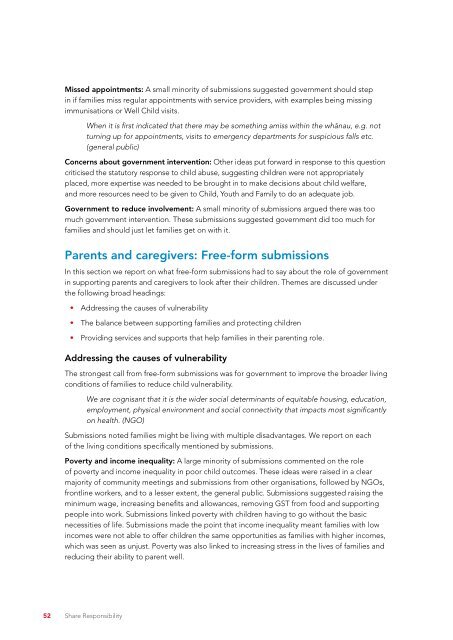The Green Paper for Vulnerable Children - Ministry of Social ...
The Green Paper for Vulnerable Children - Ministry of Social ...
The Green Paper for Vulnerable Children - Ministry of Social ...
Create successful ePaper yourself
Turn your PDF publications into a flip-book with our unique Google optimized e-Paper software.
Missed appointments: A small minority <strong>of</strong> submissions suggested government should stepin if families miss regular appointments with service providers, with examples being missingimmunisations or Well Child visits.When it is first indicated that there may be something amiss within the whānau, e.g. notturning up <strong>for</strong> appointments, visits to emergency departments <strong>for</strong> suspicious falls etc.(general public)Concerns about government intervention: Other ideas put <strong>for</strong>ward in response to this questioncriticised the statutory response to child abuse, suggesting children were not appropriatelyplaced, more expertise was needed to be brought in to make decisions about child welfare,and more resources need to be given to Child, Youth and Family to do an adequate job.Government to reduce involvement: A small minority <strong>of</strong> submissions argued there was toomuch government intervention. <strong>The</strong>se submissions suggested government did too much <strong>for</strong>families and should just let families get on with it.Parents and caregivers: Free-<strong>for</strong>m submissionsIn this section we report on what free-<strong>for</strong>m submissions had to say about the role <strong>of</strong> governmentin supporting parents and caregivers to look after their children. <strong>The</strong>mes are discussed underthe following broad headings:• Addressing the causes <strong>of</strong> vulnerability• <strong>The</strong> balance between supporting families and protecting children• Providing services and supports that help families in their parenting role.Addressing the causes <strong>of</strong> vulnerability<strong>The</strong> strongest call from free-<strong>for</strong>m submissions was <strong>for</strong> government to improve the broader livingconditions <strong>of</strong> families to reduce child vulnerability.We are cognisant that it is the wider social determinants <strong>of</strong> equitable housing, education,employment, physical environment and social connectivity that impacts most significantlyon health. (NGO)Submissions noted families might be living with multiple disadvantages. We report on each<strong>of</strong> the living conditions specifically mentioned by submissions.Poverty and income inequality: A large minority <strong>of</strong> submissions commented on the role<strong>of</strong> poverty and income inequality in poor child outcomes. <strong>The</strong>se ideas were raised in a clearmajority <strong>of</strong> community meetings and submissions from other organisations, followed by NGOs,frontline workers, and to a lesser extent, the general public. Submissions suggested raising theminimum wage, increasing benefits and allowances, removing GST from food and supportingpeople into work. Submissions linked poverty with children having to go without the basicnecessities <strong>of</strong> life. Submissions made the point that income inequality meant families with lowincomes were not able to <strong>of</strong>fer children the same opportunities as families with higher incomes,which was seen as unjust. Poverty was also linked to increasing stress in the lives <strong>of</strong> families andreducing their ability to parent well.52 Share Responsibility
















